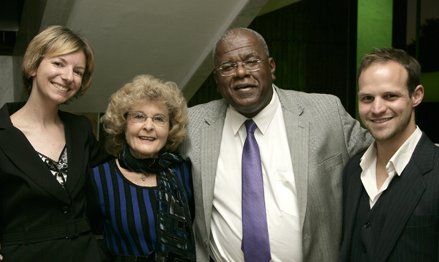Latest News Archive
Please select Category, Year, and then Month to display items
![]()
RAG has a new
name and format:
ACT—
Active, Civic, Teaching.
The University of the Free State (UFS) is ready to kick off the new year with a bang. Get ready to celebrate the start of university with a cause. RAG, as you know it, has a new name and format: ACT—Active, Civic, Teaching.
You get further if you pull in the same direction, rather than various good-intentioned movements on different routes. In a collective effort, four exciting programmes will take flight, which are listed below:
- Schools project for first-year students: mentored by senior students, groups of first-year students will be assigned to, and participate in local school projects. Students will learn to solve problems and work together in small groups as they collaborate on a specific community project involving primary or secondary schools in the Mangaung region.
- Community gardens: This project will help individual student communities to begin and maintain their own vegetable gardens in order to address food insecurity within their own environment.
- Eco-vehicle project for senior students: The aim of the eco-vehicle project is to create an interdisciplinary experience. Undergraduate senior students from a Student Life College (SLC) can work together to build an eco-vehicle from waste material. The track day, along with creative pit stops, will take place on 16 February 2018, preceding the Community celebration of 17 February 2018.
- Community celebration: To foster good relationships between the UFS and the community, we aim to host an annual celebration that will be open to the broader Mangaung community. The celebrations will kick off on the morning of 17 February 2018 with a business relay and a showcase of the eco-vehicles. The festive day will conclude with an evening music concert.
Keep checking the UFS website for updates about more ACT activities during the month of February.
'England, the English and the problem of education in South Africa.’
2013-09-26
|
 |
Attending the lecture were, from the left: Dr Susan Brokensha, Senior Lecturer: Department of English; Prof Rosemary Gray, Professor Emeritus (Honorary Life Vice-President of the English Academy of Southern Africa); Prof Jonathan Jansen; and Dr Thinus Conradie, Lecturer: Department of English.
Photo: Johan Roux
26 September 2013 |
Prof Jonathan Jansen: Lecture
The university celebrated the life of one of South Africa's most renowned art critics, hosting the 2013 English Academy’s Percy Baneshik Memorial Lecture on the Bloemfontein Campus.
The keynote lecture was delivered by Prof Jonathan Jansen, Vice-Chancellor and Rector, who joined a distinguished list of speakers to have delivered the lecture. Presented annually by the English Academy of Southern Africa, an association dedicated to promoting the effective use of English as a dynamic language in Southern Africa, past speakers include Prof Es’kia Mphahlele, Prof Njabulo Ndebele, Dr Alan Paton and Prof Albie Sachs. The lecture is hosted at venues across the country and this year Bloemfontein paid tribute to Percy Baneshik.
In his speech Not even colonial born: England, the English and the problem of education in South Africa,' Prof Jansen addressed the dilemma of the politics of language in both school and university education today.
Talking about the dominance of English in schools, Prof Jansen said it is the language of choice because indigenous languages are so poorly taught. "Simply learning in your mother tongue is absolutely no guarantee of improved learning gains in school. The problem is not the language of instruction; it is the quality of teaching, the knowledge of curriculum and the stability of the school."
Prof Jansen told the audience in the CR Swart Hall that Afrikaans-exclusive, or even Afrikaans-dominant white schools represent a serious threat to race relations in South Africa. "You simply cannot prepare young people for dealing with the scars of our violent past without creating optimal opportunities in the educational environment for living and learning together."